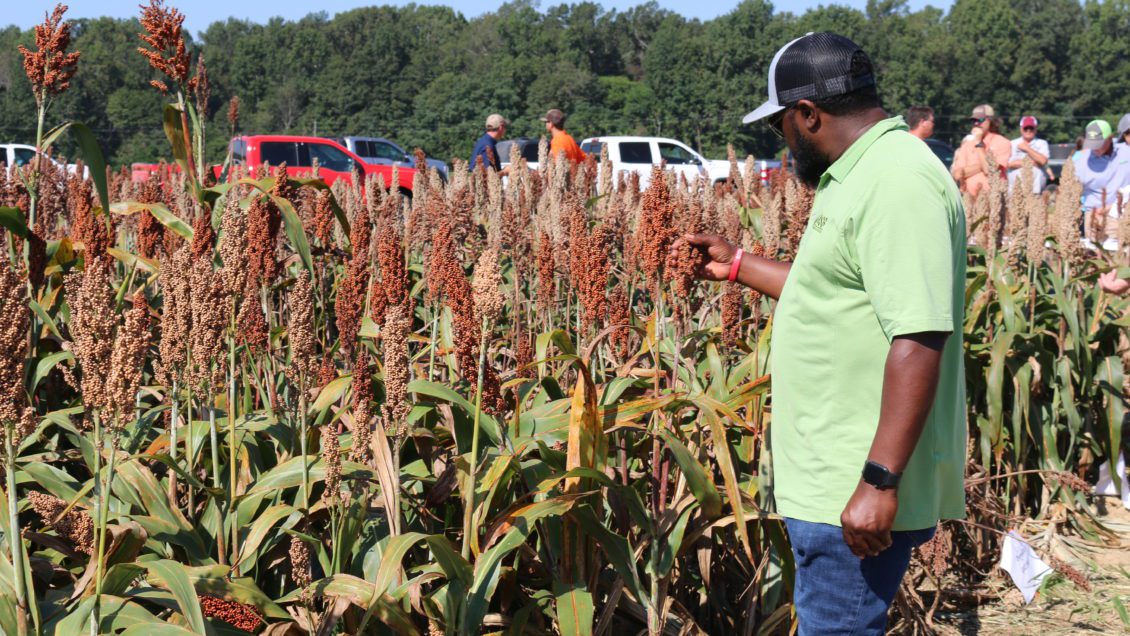
I trust information from the Clemson Extension Service because I know agents and specialists have already done the research and I will benefit from the information they provide.
– Henry Houser, a grower from Bowman, South Carolina
Tarnished plant bugs and thrips are major insect pests for South Carolina cotton. But Clemson University researchers assure growers help is on the way.
During the 2022 Agronomic and Vegetable Field Day at the Edisto Research and Education Center (REC) in Blackville, South Carolina, Clemson entomologist Jeremy Greene told growers, although not available now, Thryvon Bt technology from Bayer has been found to show increased protection against these pests in cotton.
“Pending regulatory approvals, Thryvon should be available soon,” Greene said.
To predict thrip risks, Greene encourages the use of the Thrips Infestation Predictor for Cotton tool, https://ift.tt/t71g8Le. This tool predicts thrip risks using information based on field location and planting date.

As for the effectiveness of other cotton technologies, Greene reported bollworms are developing resistance to older traits used in Bt cotton.
Other cotton insect pests growers should pay attention to include the brown marmorated stink bug, green stink bug, southern green stink bug and other species.
Bhupinder Farmaha, Clemson Cooperative Extension Service nutrient management specialist, is conducting an on-farm study related to cover crops and fertility management. This research is being conducted to determine how to make future nitrogen recommendations related to soil health.
Farmaha is looking for farmers to participate in this study. Farmers who want to get involved are asked to contact Farmaha at (217) 778-5170 or their local Clemson Extension agent.
Irrigation, double cropping, nematodes, nitrogen management and herbicides
Other topics discussed at the field day included a discussion by Jose Payero, Clemson Extension irrigation specialist, about the potential use of subsurface drip irrigation (SDI) to irrigate row crops in fields where installing a center pivot would not be feasible. Payero also discussed and demonstrated the use of a wireless sensor network to automate irrigation based on real-time soil moisture data.

Clemson doctoral student Bennett Harrelson talked about his research related to double-cropping soybean after corn. Harrelson is studying under Michael Plumblee, Clemson Extension corn and soybean specialist, and is looking at several different agronomic factors revolving around the double crop corn and soybean production system including planting and harvest dates, row spacing and the use of at-plant nitrogen. The researchers also are studying to determine if this double-cropping system leads to issues with plant-parasitic nematodes building up under certain scenarios.
Nematodes can present issues for South Carolina farmers. John Mueller, Clemson Extension row crop pathologist, talked about nematode management in cotton and soybeans. Mueller also talked about fungicides for foliar diseases in cotton and soybeans. Seed treatment fungicides normally do a good job of controlling seedling diseases in soybeans. Seedling diseases occur on South Carolina cotton every year. Disease incidence and severity are determined by environmental factors such as soil temperature and moisture, as well as by seed quality and vigor. Seedling disease management relies on using cultural practices and fungicides.
Participants also heard about nitrogen management in grain sorghum by Alex Coleman, in addition to information about seedling cotton response to pre-herbicides and 2,4-D herbicide programs in Enlist Soybeans by Sarah Holladay, Clemson doctoral student, and Michael Marshall, Clemson Extension weed scientist.
Sweet potato research
Field day participants also learned of sweet potato studies Phillip Wadl, research geneticist in charge of the Sweet Potato Breeding Program at the United States Department of Agriculture’s Agriculture Research Service (USDA-ARS) U.S. Vegetable Laboratory in Charleston, South Carolina, is working on with Gilbert Miller, Clemson Extension vegetable specialist housed at the Edisto REC, and Brian Ward, Clemson organic vegetable specialist and Matthew Cutulle, Clemson vegetable weed scientist, both housed at the Coastal REC in Charleston.
One test involves clones planted on beds covered with organic black plastic mulch. The researchers note that, although more research needs to be conducted, “…it appears that plastic mulch may deter subterranean insects” and “…the results of this study show that black plastic mulch is a viable production system for organic sweet potato in South Carolina, as well as other southern states in the United States.”
Recommendations have been provided for growers. More information about this research can be found in the March 22, 2022, edition of HortTechonology magazine.
Clemson field days benefit South Carolina growers

Henry Houser from Bowman, South Carolina, grows peas, okra, butterbeans, watermelons, sweet potatoes and more. He depends on Clemson Extension information to help him be successful. He attended the field day to hear about the sweet potato research and drip irrigation.
“I try to plant a little bit of almost everything,” Houser said. “I attend these field days so that I can learn more about growing different crops. I trust information from the Clemson Extension Service because I know agents and specialists have already done the research and I will benefit from the information they provide.”
In addition to attending field days, Houser said he also gets information when he visits his local Clemson Extension office to talk with agents.
-END-
Get in touch and we will connect you with the author or another expert.
Or email us at news@clemson.edu
"vegetable" - Google News
October 10, 2022 at 03:27PM
https://ift.tt/Hb50fOJ
Clemson Agronomic and Vegetable Field Day highlights latest research/technology - Clemson News
"vegetable" - Google News
https://ift.tt/QgdjipI
https://ift.tt/KcTeofF
Bagikan Berita Ini














0 Response to "Clemson Agronomic and Vegetable Field Day highlights latest research/technology - Clemson News"
Post a Comment